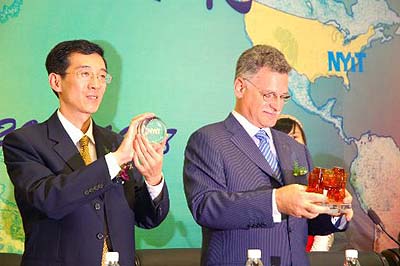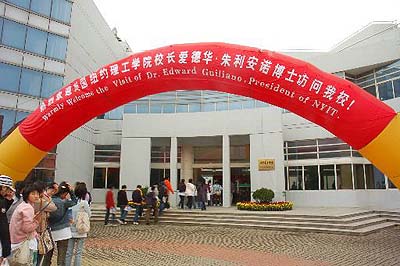|

The crush of qualified Chinese students seeking admission to foreign universities is nearly impossible to satisfy. Many students, armed with shining test scores and perfect grades, are turned down due to visa restrictions, prohibitive costs or the sheer competition of thousands of students vying for a limited number of admissions.
Now, college students in Nanjing have a chance to study abroad without ever leaving China, with the October 8 opening of an undergraduate campus of an American university, complete with English-language classes and coursework that mirrors exactly what classmates are learning in the United States. The university, an outpost of the New York Institute of Technology (NYIT), is the first American-style undergraduate school on the Chinese mainland and was launched in collaboration with the Nanjing University of Posts and Telecommunications (NUPT).
NYIT is on a mission to be a global university, said NYIT President Edward Guiliano, Ph.D. The model for the 21st-century university "will not be a bricks-and-mortar, one location, local university," he said, and it's also not an international university. Instead, he said, the trend is toward "one university in a global landscape that plays in idea centers around the globe and plays in a global economy that has a mobility of students, faculty and ideas."
This year, 321 students are enrolled at NYIT's Nanjing campus, and Guiliano said he hopes enrollment will grow to 6,000 students in five years. Students can choose to earn "parallel degrees" from both NYIT and NUPT, or can focus solely on a NYIT degree, and all students are automatically approved to take courses at other NYIT campuses in New York, Canada, South America and the Middle East, pending a successful visa application.
Six NYIT professors from New York are already in Nanjing, teaching classes and setting up the American-style programs. Classes are solely in English and follow the exact coursework and requirements of the American campuses, and NYIT has offered additional resources in Nanjing to help students that are struggling with language issues. Applicants for enrollment also must past the TOEFL, "or equivalent" to gain admission to the Nanjing campus, Guiliano said.
"Our Nanjing campus is unlike any other in China," James H. Nolt, Dean of NYIT's Nanjing campus, said in university release. "Chinese and American educators view it as a blueprint for quality higher education in a nation with 20 percent of the world's population; students see it as a ticket to winning greater influence, multiple job offers and higher salaries."
Guiliano said Chinese students earning a degree from the Nanjing campus have an edge in looking for jobs post graduation. English language fluency and a foreign degree still go a long way with potential employers, many of which now are operating with or seeking foreign investment. Any edge is welcome. According to Xinhua [China's official news agency], 5.59 million students will graduate from higher education institutions in China in 2008, an increase of 640,000 over this year. However, 30 percent, or 1.4 million college graduates failed to find a job in 2007.

American-style education is inquiry based, rather than rote learning, with smaller classes and a focus on problem solving. Professors are seen more as coaches, with individual attention on students, rather then a simple lecturer, Guiliano said.
"There is a high premium on innovation. That's what American education brings as a model," he said. "So the [Chinese graduating] students are very career motivated and they want to apply what they've learned in their jobs and solve cases and problems that way."
NYIT is also focused on providing an American-style experience for undergraduate students. In the United States, the first years of college are not focused solely on classes, but are also viewed as important years to develop friendships and transition to adulthood for young Americans. To that end, NYIT in Nanjing has organized a men's basketball team and plans to offer social activities such as American movie nights so that students can bond and experience how undergraduates live in the United States.
The Department of Education in Jiangsu Province financed the construction of a modern campus for NUPT with a separate section for NYIT. The provincial government has been key to the launch of the new NYIT undergraduate campus, Guiliano said, as foreign universities have historically faced strict regulations on involvement in undergraduate education in China. Chinese education policy makers "rightfully" didn't want students to be unduly exploited, he said, and it's only through a decade of building programs and trust between NYIT and its Chinese partners that the newest program is possible. In addition, over the past two years the Chinese Government has begun seeking solutions to accommodate the rapidly expanding population of qualified students that seek a college education.
"We have been in China for 10 years with programs, so we would fall into that category of a university that has a long-term commitment and belief in developing strong relations," Guiliano said.
NYIT has long-standing partnerships in China, with an MBA program offered in conjunction with Jiangxi University of Finance and Economics (JUFE) in Nanchang and Shenzhen, and a double-degree master's program in human resource management at Shanghai's Tongji University.
"Sending faculty to China, and sending administrators to China over 10 years has developed a much greater sophistication and appreciation among our faculty and administration for what's going on in China and a true love for the students," he said.
NYIT is a "not-for-profit" private university, he said, meaning that any revenue above costs is reinvested back into the student population in the form of scholarships, additional resources and university development. The tuition for the Nanjing campus is obviously higher than China's government-funded institutions, he said, but it is not as expensive as NYIT in New York.
"There's a wonderful similarity between Chinese culture and American culture regarding education. The American Dream is made up of hard work and a good education. You'll do better than your parents if you get a good education, and the Chinese fully embrace that. The parents and grandparents will invest in their child's education," he said.
Guiliano said NYIT students from the New York will also be able to attend classes on the Nanjing campus, and the exchange is aimed to provide all NYIT students with a globalized educational offering. As culture and business crosses borders, education must follow suit.
"Access to opportunities for qualified students is one of our three mission statements and that means a lot of things. Over the years, it's meant that we've brought NYIT's American education to veterans online, to Florida 20 years ago before there was such a strong university system there, it could mean that we go where emerging markets are. After 9/11, a lot of people in the United States didn't want to send their child more than driving distance away from home. It is no different in the Middle East or the Far East," Guiliano said.
(Reporting from New York) | 